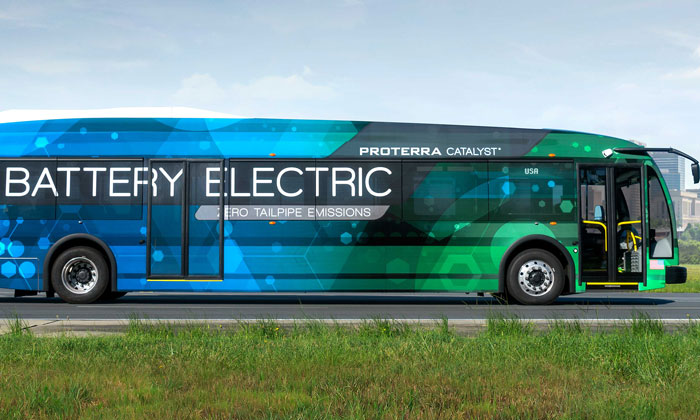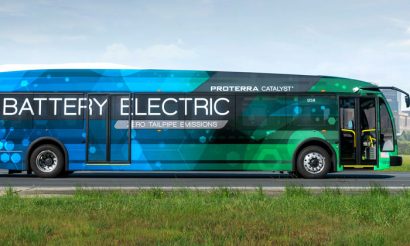First 100% electric, zero emissions BRT route opens in the U.S.
- Like
- Digg
- Del
- Tumblr
- VKontakte
- Buffer
- Love This
- Odnoklassniki
- Meneame
- Blogger
- Amazon
- Yahoo Mail
- Gmail
- AOL
- Newsvine
- HackerNews
- Evernote
- MySpace
- Mail.ru
- Viadeo
- Line
- Comments
- Yummly
- SMS
- Viber
- Telegram
- Subscribe
- Skype
- Facebook Messenger
- Kakao
- LiveJournal
- Yammer
- Edgar
- Fintel
- Mix
- Instapaper
- Copy Link
Posted: 22 August 2017 | Intelligent Transport | 1 comment
San Joaquin Regional Transit District (RTD) will convert its existing Bus Rapid Transit (BRT) Express Route 44 to 100% battery-electric, zero-emissions buses in August 2017. The route will be the first in the U.S. to feature an all-electric bus service.


San Joaquin Regional Transit District (RTD) will convert its existing Bus Rapid Transit (BRT) Express Route 44 to 100% battery-electric, zero-emissions buses in August 2017. The route will be the first in the U.S. to feature an all-electric bus service.


The BRT buses were designed and built by California-based Proterra, an innovator in heavy-duty battery-electric transportation.
At the time of the conversion, Route 44 will be extended to serve passengers from the Downtown Transit Center (DTC) in Central Stockton to as far south as Qantas Lane near Arch-Airport Road. The change will enable people who work or study at locations such as PG&E, Dorfman Pacific, Venture Academy, San Joaquin County Office of Education, and the Economic Development Department Qantas Lane office, to commute rapidly and economically.
“We at RTD are proud of our history of commitment to clean energy initiatives,” said Donna DeMartino, RTD’s CEO. “With the nation’s first all-electric BRT route, RTD and Stockton are now leading the charge in providing safe, efficient, reliable, and exceptionally clean transportation to people who live and work in south Stockton.”
The benefits of using electric buses include:
- Cleaner air
- Quieter operation
- Reduced maintenance cost
Electric buses can travel up to 40 miles or two hours on a charge. The RTD charging stations take about 10 minutes to completely recharge a bus.
The price of each bus is approximately $850,000. RTD received grant funding to cover the cost of the new electric buses.
RTD will launch a second all-electric BRT route in January 2018 along the MLK corridor in South Stockton. That route will connect with RTD’s existing three BRT corridors.
BRT routes move passengers to desired destinations faster than other types of bus routes. In further support of RTD’s commitment to its clean air initiatives, the RTD’s Board of Directors passed an official resolution to declare its intent to convert to 100% electric, zero emission buses for all routes serving the City of Stockton by 2025.
Related cities
United States of America
Related organisations
Proterra




Beside the positive side of the electric buses, there are also a few challenges:
A. As of today, the electric bus is significantly more expensive than a diesel bus, but the cost is expected to go down.
B. Adjustments must be made to the energy system according to the area in which the bus operates.
C. The conventional charging system limits the driving distance. Charging systems that enable long driving distance are stile very expensive.
D. Building a working plan (schedule) for an electric bus should consider a variety of parameters about the energy system.
E. Real-time energy system monitoring is required to prevent malfunctions and delays.
Optibus, that develops solutions to optimizing the use of vehicles and drivers in real-time, added special modules for electric buses both for building optimal working plans and for real-time monitoring and rescheduling.
There is no doubt that the advantages of the electric bus, and especially its contribution to the quality of life of all of us, justify the efforts and costs required in the initial stages of implementation.